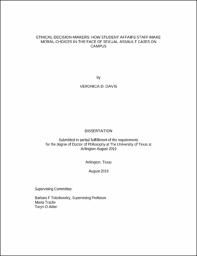
ATTENTION: The works hosted here are being migrated to a new repository that will consolidate resources, improve discoverability, and better show UTA's research impact on the global community. We will update authors as the migration progresses. Please see MavMatrix for more information.
Show simple item record
| dc.contributor.advisor | Tobolowsky, Barbara | |
| dc.creator | Davis, Veronica Daryl | |
| dc.date.accessioned | 2019-08-27T17:34:32Z | |
| dc.date.available | 2019-08-27T17:34:32Z | |
| dc.date.created | 2019-08 | |
| dc.date.issued | 2019-08-08 | |
| dc.date.submitted | August 2019 | |
| dc.identifier.uri | http://hdl.handle.net/10106/28579 | |
| dc.description.abstract | This qualitative study examined the experience of seven student affairs staff at a private, religiously oriented university in the South who deal with sexual assault cases. Using Nathaniel’s (2006) theory of moral reckoning (TMR) from the field of nursing in coding and analysis, several themes emerged including for staff seeing value in legal and policy training by the university, experiencing moral conflict, and being able to cope with it in order to continue in their profession.
The implications of these themes have relevance to practice, theory, and future research. For practice, because the adjudication of these cases is personally challenging, the university should encourage staff who are involved in this work to attend counseling services off campus and provide the means to do so. The university should provide the public and students with a flowchart of the reporting process of sexual assault cases so that the process is clear. The university should also revisit housing policies surrounding moving accused students to other facilities or cancelling their on-campus options and hold a public forum to educate stakeholders (i.e., students, staff, faculty, and administrators) in the university committee about required responses of sexual assault that can happen when adjudicating these incidences. As the first study to apply TMR to student affairs staff, it showed that the theory is applicable beyond nursing. The staff admitted they do experience moral stress dealing with these highly charged cases and offered a range of ways they cope with it. Given the limited scope of the study, future research should include more perspectives – like those of campus police and Title IX coordinators and other types of campuses in other parts of the United States – and explore the meaning of consent for staff on campus. | |
| dc.format.mimetype | application/pdf | |
| dc.language.iso | en_US | |
| dc.subject | Higher education | |
| dc.subject | Sexual assault | |
| dc.subject | Student affairs | |
| dc.subject | Sexual misconduct | |
| dc.subject | Moral conflict | |
| dc.title | Ethical Decision-Makers: How Student Affairs Staff Make Moral Choices in the Face of Sexual Assault Cases on Campus | |
| dc.type | Thesis | |
| dc.degree.department | Educational Leadership and Policy Studies | |
| dc.degree.name | Doctor of Philosophy in Educational Leadership and Policy Studies | |
| dc.date.updated | 2019-08-27T17:34:40Z | |
| thesis.degree.department | Educational Leadership and Policy Studies | |
| thesis.degree.grantor | The University of Texas at Arlington | |
| thesis.degree.level | Doctoral | |
| thesis.degree.name | Doctor of Philosophy in Educational Leadership and Policy Studies | |
| dc.type.material | text | |
| dc.creator.orcid | 0000-0001-5419-9455 | |
Files in this item
- Name:
- DAVIS-DISSERTATION-2019.pdf
- Size:
- 888.6Kb
- Format:
- PDF
This item appears in the following Collection(s)
Show simple item record


